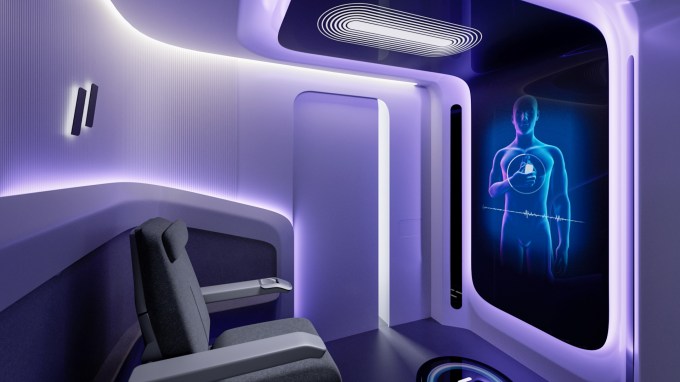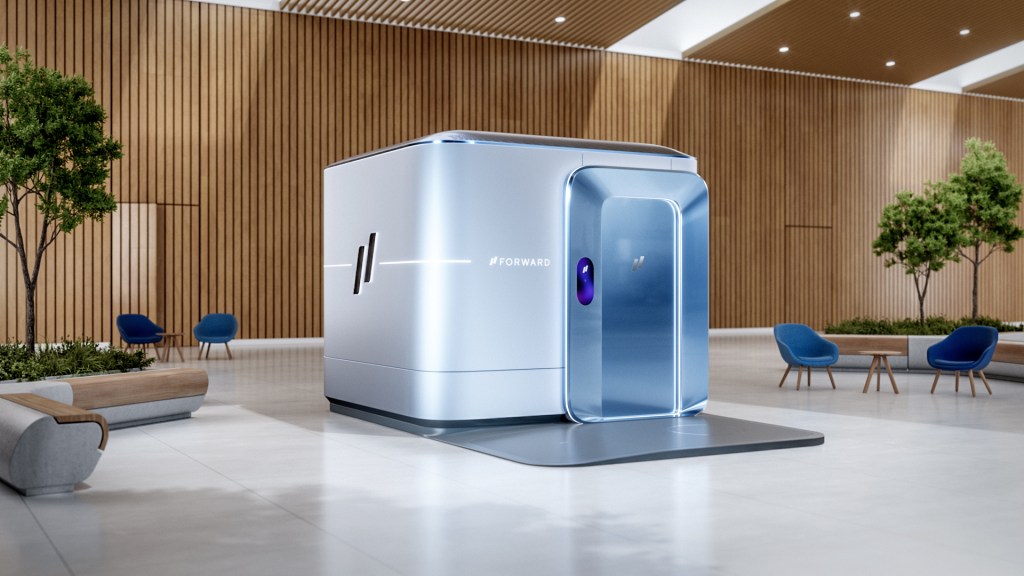Adrian Aoun, CEO and co-founder of Forward Health, aims to scale healthcare. It started in 2017 with the launch of tech-forward doctors’ offices that eschewed traditional medical staffing for technology solutions like body scanners, smart sensors and algorithms that can diagnose ailments. Now, in 2023, he’s still on the same mission, and rolled up all the learnings and technology found in the doctor’s office into a self-contained, standalone medical station called the CarePod.
The CarePod pitch is easy to understand. Why spend hours in a doctor’s office to get your throat swabbed for strep throat? Walk into the CarePod, soon to be located in malls and office buildings, and answer some questions to determine the appropriate test. CarePod users can get their blood drawn, throat swabbed and blood pressure read — most of the frontline clinical work performed in primary care offices, all without a doctor or nurse. Custom AI powers the diagnosis, and behind the scenes, doctors write the appropriate prescription, which is available nearly immediately.
The cost? It’s $99 a month, which gives users access to all of the CarePod’s tests and features. As Aoun told me, this solution enables healthcare to scale like never before.

Charging forward
Forward Health was founded in 2016 by Adrian Aoun, Erik Frey, Ilya Abyzov and Robert Sebastian. The company has since raised $657.50 million, including a $100 million round it’s announcing today.
The company’s board of directors is impressive. It includes Aoun, Brian Singerman of Founders Fund, Keith Rabois of Khosla Ventures, Patrick Pichette of Inovia Capital, Ram Shriram of Sherpalo Ventures, and Lynne Benioff. The who’s who of Silicon Valley continues with Forward’s advisors: Eric Schmidt, John Doerr III, Marc Benioff and Marissa Mayer.
Forward Health already has facilities throughout the United States, including LA, New York, Chicago, SF and Washington, D.C. These locations, which the company started opening in 2017, have the same tech-first approach as CarePods. However, they look and feel more like traditional healthcare facilities fused with an Apple Store. First-time patients receive a full biometric assessment and collect up to 500 biometric data points to help its systems diagnose and treat different conditions and ailments.
In 2017, Aoun told TechCrunch, “We need to figure out how to scale doctors so that they touch more lives… The same way an engineer can scale through software.” CarePods are his answer to the scaling problem.
Aoun explained it like this: The doctor’s office was Forward Health’s Model S; the CarePod is the company’s Model 3. “Elon Musk started with the Model S, which led to his Model 3,” he said. “Our Model S was a high-tech doctor’s office in San Francisco, and we scaled it up to 20-25 cities. But a high-tech doctor’s office will never scale to the whole planet.”
Forward had to start with traditional medical offices. It provided the company with a critical development layer where it could fine-tune and expand its medical services to address various conditions: skin scanners for skin issues, body scanners for heart concerns, etc. Forward expanded its offering again during the COVID pandemic, launching remote patient monitoring products.
CarePods brings Forward’s past learnings together to create a scalable, all-in-one medical solution. The company is launching 25 CarePods with its first release and plans to scale the deployment to 3,200 CarePods in a year.
Your AI doctor’s office
Here’s how it works: Users walk up to the door and unlock it with their mobile device. They step in alone and find a large touchscreen facing a chair. A glowing ring on the floor indicates the location of the full-body scanner. A hidden drawer on one of the sides delivers different medical tests as needed. A friendly female voice guides the patient through the process.
The CarePod’s screen serves up different apps available to the user: full body scan, heart health, thyroid testing, blood pressure, weight management, diabetes screening, COVID-19 test, HIV screening, kidney, and liver health — there seems to be an app for many ailments. Let’s say you pick heart health. The drawer opens and presents the patient with a sensor. The touchscreen instructs the user to place the sensor against their heart, and after a few tests, the diagnosis is displayed on the screen. And if more treatment is required, one of Forward’s doctors will review the findings in real time and issue a prescription or additional instructions.
Blood tests are performed with a single-use, needleless collection device. Blood pressure is measured using a wireless arm cuff. Skin testing uses a scanner. Various swabs are available to test for COVID-19, strep and other ailments. The company says it also tests for STDs but does not detail which type or how it completes the diagnosis.
Each CarePod is staffed with an attendant who can answer basic questions and services the device between uses. These attendants do not join the patient in the pods. Have a medical question? Users can speak to a doctor through the mobile app.
The monthly cost is $99 and includes on-demand access to the CarePod, the health apps, blood testing the Forward mobile app (access to all health data and health plans), 24/7 care team support and virtual visits with Forward doctors. Forward Health will continue operating its standalone doctor’s office, too. Access to those locations costs $149 a month. The company does not accept insurance.
PhDs and MDs
Adrian Aoun is quick to explain that he’s not a medical doctor. He’s a computer scientist specializing in AI. Before founding Forward Health, he ran special projects at Google and reported to then-CEO Larry Page after Google acquired his natural language processing startup, Wavii, in 2013.
“Basically, what I’m doing is slowly migrating every single thing from a doctor and nurse to hardware and software,” he said. “We don’t even believe a doctor’s office should exist. We think that it’s a thing of the past.”
And yet Forward Health employs over 100 primary care clinicians and has a medical advisory board of five licensed medical doctors. Aoun sees Forward’s solution as offering patients the best of both worlds: access to the latest tests and research, and care plans developed by AI and approved by a team of trusted doctors.
Forward’s secret sauce is its custom-built LLM, which is trained to find the latest research papers and extract the clinical protocol. Safeguards are built-in throughout, and Forward’s clinical team has access to a dashboard that allows them to run countless permutations to check the viability of the AI-developed care plan. The system can also be hand-fed the latest research, as Aoun demonstrated to me. He dragged a 30-page research paper from his desktop to the web application, and the system spat out a summary and started building the care plan decision tree based on the paper.
“We’re using AI to read the research, pull out the care plans and deliver it to consumers,” Aoun said. “This is exciting because there are academic medical institutions with awesome research, and it never gets out to the world… It’s cool that we can use the latest, proper research anytime.”
Personal privacy is paramount for Forward Health. Aoun provided TechCrunch with a statement on the company’s approach, and it’s reprinted in full here:
Forward uses best-in-class security practices for data encryption and access control. We regularly conduct third-party security audits to evaluate our security position and ensure strict controls. We have a robust set of privacy practices in compliance with federal laws to safeguard our members’ data. Forward members always own their own data and we will never sell their data to third parties.
Aoun explained that the member agreement states that Forward will not and does not sell any personal data. “We do not have that as a business model,” he emphasized, adding, “The nice thing is we don’t take insurance, and so because we don’t take insurance, we’re really not giving your data to anyone. The only exception is with referrals to specialists. We’ll do that for you. But we’re not in the business of sending out your data. I don’t think that’s cool.”
Forward Health is installing CarePods in malls, gyms and offices, including one in Chicago’s Willis Tower. The company says in a press release that it plans to double its footprint in 2024 and start the nationwide rollout in the San Francisco Bay Area, New York, Chicago and Philadelphia. The exact timing was not provided.

The AI future
I spent an hour with Adrian Aoun talking through CarePods, where he answered all my questions without hesitation. And I had so many questions. The sleek rendered images and splashy video promos paint a picture of another tone-deaf solution from Silicon Valley. But in the context of the company’s long developmental roadmap, CarePods start to make sense. This solution was not developed overnight but used data and learnings from Forward’s other products over several years.
Aoun spends a lot of time answering the same obvious questions I asked him about functionality, privacy and future features. CarePods just seem too good to be true. But allegedly, he’s not spending much time answering user questions, questions from investors and the press. He says everyday users understand it from their first use.
“Consumers go in, and they play it, and it just makes sense,” he told me, saying it feels like you’re walking into a giant iPad. “It’s not that confusing for people.”
Aoun has ambitious plans for CarePods, and the company’s proven ability to iterate and develop new solutions shows it’s likely agile enough to work through early adopter issues. CarePods has a surprising number of features, and Forward Health will keep creating more.
“We don’t do MRIs yet, and one day I want to do open heart surgery, and that might take me 20 years,” Adrian Aoun said to me. Ambitious? Yep, but I believe him. Maybe one day I’ll be able to go to the mall, get some sneakers, a pretzel and a triple bypass.






































Comment